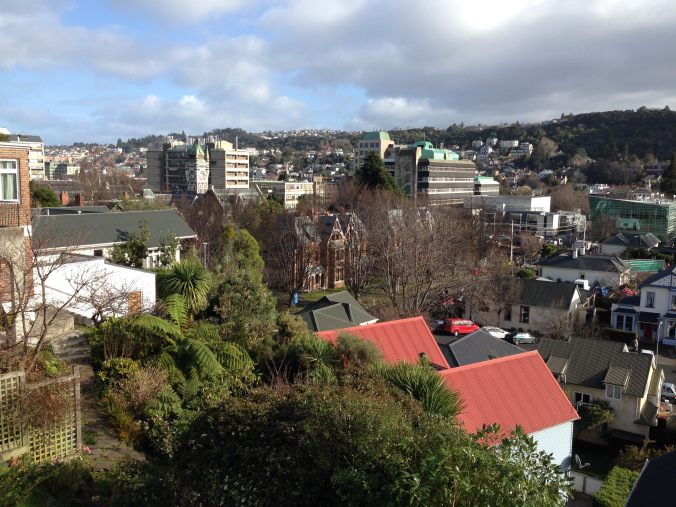My second stop in New Zealand is at a place known as “Dunedin”, named by the Scottish settlers who were reminded of Edinburgh, Scotland due to the steep hills of the location (or so I was told). Upon arriving in Dunedin, Google Maps informed me that my hostel was only a 25-minute walk from the bus depot. Google Maps was wrong. If Dunedin was flat, then 25 minutes would likely be very accurate. The trek to my Hostel was all up hill. Extremely up hill. I’m pretty sure I did 5 months worth of working out within an hour and fifteen minutes, as I was hauling my 50+ pound suitcase with me. I took frequent breaks, and luckily, I had a full water bottle with me so I could stay hydrated.
On my second day in Dunedin, I visited University of Otago, Arana College, Studholme College, and University College. Like Australian colleges, a college in New Zealand refers to a residence hall, not a degree granting institution. But unlike many Australian Colleges, University of Otago owns and runs most of the colleges nearby. Only a few of the colleges near campus are independently run from the university (though they are formally affiliated with the university). What I found to be both interesting and amusing is the fact that the person who oversees an entire college area is known as a “warden”, and a resident assistant is referred to as a “sub-warden”. The term “warden” typically refers to a prison head in the United States. In New Zealand, a “ward” is a plot of land, and a “warden” is the person who oversees everything happening on that land.
The structure of higher education in New Zealand is different in comparison to U.S. and Australian higher education. The New Zealand government subsidizes 72% of the cost of higher education for any New Zealand citizen who wishes to attend a university. Government loans and the 72% subsidy are not available for international students who wish to study in New Zealand. Just as the case is with the US and Australia, international students must pay the entire cost of higher education out-of-pocket. The out-of-pocket cost for domestic students is about $5000NZ per year. A student can typically finish their bachelor’s degree in only three years, as students are not required to take “general education” requirements, which is something most universities in the U.S. require. New Zealand students can take loans out from the government just as students in the U.S. or Australia can from their respective governments. However, New Zealand students can only take out loans for the cost of tuition and not for room and board.
New Zealand students who wish to attend a university often receive help from their parents, or the student may take a year off prior to attending a university to save up money to pay for their education. What is amazing though is the loans students may take out from the government are interest-free (the loans remain interest-free even after graduation) as long as the borrower remains a New Zealand citizen. If you leave the country for more than 6 months, interest will begin to accrue on the loans. Graduates of a New Zealand university will begin paying back their loans through their “taxes”. Basically, part of a person’s paycheck is withheld and put toward paying back their loans. However, you only have to begin paying back your loans if you are making a minimum of $19,000NZ per year. This threshold is much less than the $50,000 required by the Australian government higher education laws.
I had the opportunity to speak with a professional who is American, but has been living and working in New Zealand for the past 25 years or so, working for University of Otago for the past 7 years. He taught me that the university admission system is very different in New Zealand compared to the US. In the United States, students are essentially competing for admission to universities, where some schools are harder to get into than others (with the exception of community colleges which operate differently). In New Zealand, you can apply to whichever university you would like to attend, and they cannot turn you away. As a result, there is an enormous range of diversity when it comes to student background. Something else that contributes to the range of diversity among student perspective for University of Otago is the fact that 80% of students who attend the university come from other parts of New Zealand, not Dunedin where the university is located.
I’m so glad to have this opportunity to learn about yet another foreign higher education system. I look forward to my trips to Victoria University of Wellington and University of Auckland. I hope to learn even more about New Zealand higher education when visiting these institutions.

Roshan,
When I was describing the RA job at UConn to my grandparents to India, they replied “oh, so youre like a warden.” LOL I think its actually a British term that was spread to its colonies.
LikeLike